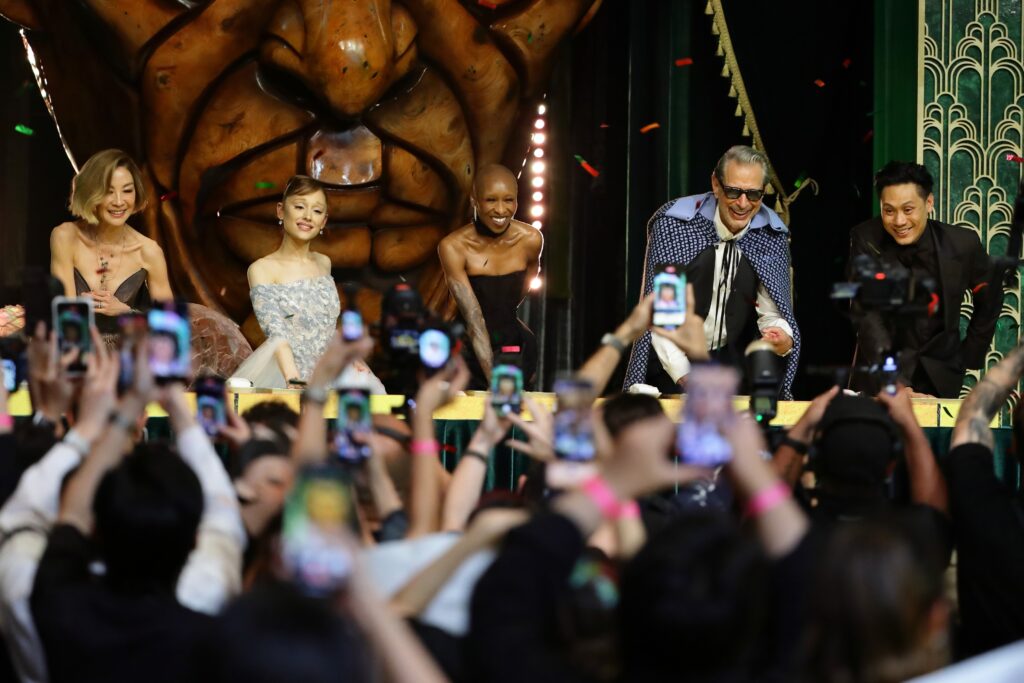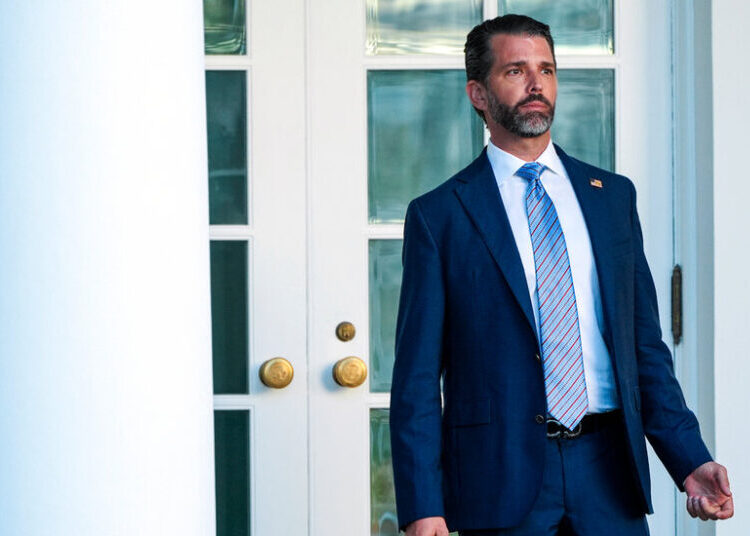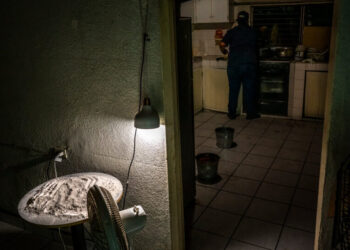LONDON — If you want to know the inspiration behind Jon M. Chu’s expansive, wondermentiful vision for the “Wicked” films, you’d have to go all the way back to Silicon Valley in the 1980s.
His family is a big deal there. Not because they’re tech moguls, but because they feed them.
It’s the day before the London premiere of “Wicked: For Good” — which just earned $150 million this weekend, for the second-biggest opening weekend of 2025 — and the 46-year-old director is scarfing down creamy Nordic onion soup in the formal dining area of the five-star Corinthia Hotel, marveling at his wild journey to this moment.
As the youngest of five kids in Los Altos, California, he spent countless afternoons folding napkins at another white-tablecloth joint: his parents’ Chinese restaurant, the local institution Chef Chu’s — known as a place where the area’s power brokers such as Steve Jobs (in Apple’s early days) and Mark Zuckerberg (still a loyal customer) could close deals over $19 platters of almond chicken.
“I just want people to know, like, you can be doodling in a Chinese restaurant in the margins of your math homework and dream about going to Hollywood with zero connections, with zero people who look like you [and still make it],” Chu says, shoveling soup into his mouth between thoughts like it’s the last sustenance he’ll have all day, which it probably is.
He’s all explosive energy, on the final stretch of a five-year project that’s consumed his every waking moment — animatedly talking with his hands, dressed in a dark gray suit with a beige shirt and red poppy pin for the U.K.’s Remembrance Day.
Thirty-six hours after our lunch, he’ll walk down a red carpet arm-in-arm with Ariana Grande and Cynthia Erivo as thousands of fans press up against barricades screaming their names. The first film got ten Oscar nominations and two wins, and Grande seems sure to get a supporting actress nomination for this one.
By now, you likely know that “For Good” has two new songs; the materialization of the Scarecrow, Tin Man and Cowardly Lion, plus Dorothy (though we never see her face); a “sex cardigan”; and a darker, deeper tone than the bubbly high school musical that preceded it a year ago.
Oz is descending into a dictatorship and Erivo’s green-skinned Elphaba is an activist on the run labeled the Wicked Witch of the West by the Wizard (Jeff Goldblum) and Madame Morrible (Michelle Yeoh) as she tries to free animals from captivity and paint warnings in the clouds such as “Our Wizard Lies.” Her friendship with Grande’s Glinda has been severed. And as Glinda becomes the spokesperson of the regime, literally put in a bubble to deliver cheerful messaging to a terrified populace, she misses her friend and starts to question her choices.
This is her movie. We all like to think of ourselves as Elphabas, the ones who take a stand even when the going is hard. But, as Chu tells me, “I think we’re mostly Glinda. We don’t have the courage to do what we say we are going to do … It’s a lot harder.”
He can relate.
Below, Chu explains the backstories of what you see on-screen in “For Good.”
Gold dragons everywhere
For anyone from a Chinese or Taiwanese family, it’s not hard to see where Chu picked up his taste for spectacle.
Doing your homework in a banquette near a bar, surrounded by restaurant chaos, not to mention red hanging lanterns and elaborate gold ornamentation, will certainly shape one’s perception of how much excess is normal.
“It was all dramatic. A Chinese family is always dramatic,” he says, laughing. “Even my dad’s dining room [at Chef Chu’s] had gold dragons all the way across. In my head I’m like” — he rolls his eyes — “‘Oh, those dragons.’ But everyone’s like, ‘You’re in the dragon room!’”
He continues: “I’ve never thought like, Oh, [a] Chinese opera! I’m trying to do that in ‘Wicked,’” he says. “But it is.”
On the outside looking in
What “Wicked” fans might not see at first is Chu’s perspective as a child of immigrants peeking out through every frame. His parents did the brave thing. His mother, Ruth Ho, came to the Bay Area with her family from Taiwan not knowing a word of English beyond Beatles and Elvis songs. His father, Lawrence Chu, was a rebel and “a hustler,” as Chu described him on NPR, who was born in China’s Sichuan province, raised in Taipei and then ran away from home as a teen to sell noodles on a train in Hong Kong before heading West.
The restaurant, opened as a tiny take-out place in 1969, grew to take over an entire strip mall building. Every Sunday his mother took them to San Francisco to see the opera or ballet or symphony, dressed in matching suits like “Asian Kennedys,” Chu writes in his 2024 memoir with Jeremy McCarter. When his father told customers that his youngest boy wanted to be a director, they donated cameras and computers, which he used to teach himself editing.
Later, when Chu arrived at the University of Southern California for film school, he stood out not just because he was Asian but because he didn’t worship Quentin Tarantino and Martin Scorsese. His touchstones were Disney movies, Michael Jackson videos and, of course, “The Wizard of Oz,” which the kids would find rummaging through VHS tapes his parents kept in suitcases because they didn’t have enough shelf space.
If you’re wondering where Elphaba gets her sense of injustice, much of it comes from the director watching customers at Chef Chu’s talk down to his parents or treat them like servants.
“I would get so angry,” he says, but his parents told him that he’d never change minds by lashing out. “They’re like, ‘If they walk out with their bellies full and their hearts full, the next time they see a Chinese family, they may treat them a little bit differently.’ And by the way, we took their money, so we all win.’”
The boy in the bubble
At the end of Part 1, when Grande’s Glinda decides not to fly off with Elphaba, “what’s so interesting,” says Chu, “is that it’s inches” between the decision she makes and the bravery that might have been.
Glinda’s just not ready to take on what’s being asked of her, and that’s okay. “You don’t just get one chapter; you get multiple chapters,” he says. “And courage doesn’t have an expiration date. So if you don’t do it one time, the window’s still often open for more.”
Chu asked lyricist Stephen Schwartz to write Glinda’s new song, “The Girl in the Bubble,” because he felt like the stage show lacked a moment when the audience saw Glinda decide to become truly good.
He’d had a similar fork in the road himself.
Chu’s had a charmed path to filmmaking. Steven Spielberg essentially discovered him at 23. The first 15 years of his career had been a parade of decent, fun, moneymaking sequels, like “Step Up 2: The Streets” and “Step Up 3D.” They’d allowed him to buy a house. He could have kept going and been set for life. But it was on the set of “Now You See Me 2” that he realized he hadn’t yet made a single movie that reflected who he was and where he came from. It’s also when two second-generation immigrant stories, Lin-Manuel Miranda’s “In the Heights” and “Crazy Rich Asians” came across his desk. He immediately jumped into both.
The latter film was where Chu felt like he found not just his voice but his purpose. “Crazy Rich Asians” brought in almost $240 million off a $30 million budget, and with it, helped buoy the careers of an entire industry of Asian actors and writers who’d been there the whole time but needed a chance to prove that their work made financial sense.
“At what point are you willing to pop your bubble and feel the intensity of what’s happening out there and try to do something?” he says.
Enticed by Elphie
Chu had dreamed of making a “Wicked” movie for almost 20 years, after first seeing the show in 2003 before it was even on Broadway. But when the opportunity came to him in late 2020, he almost turned it down. After “Crazy Rich Asians,” a blockbuster extravaganza of a preexisting IP felt like a step backward.
Then, while listening to the lyrics of “Defying Gravity” (“I’m through with playing someone else’s game”), it struck him: What if Elphaba were played by a woman of color? And if he turned down this movie, would anyone else make that crucial choice?
“Those words from us, from ‘the other,’ that’s a different story all of a sudden, about the breaking down of the American Dream,” he says. And it felt particularly resonant in the middle of covid, as Asians were being violently attacked all over the country.
“Excising people or villainizing people and making them feel like the disease has always been in our history,” he says. “Did I think that kicking Munchkins off a train or seeing animals in a cage would reflect a world we live in when this movie comes out? No, of course not.”
He held auditions, but says that “deep down” he always knew Erivo was his Elphaba. One of his key decisions was making sure her green makeup didn’t rub off, so she and the other actors could feel relaxed about touching each other.
He also listened to Erivo when she insisted that Elphaba have a whole new wardrobe in “For Good,” because she’s a witch with self-respect. To that end, Chu had the production design team make a loom for Elphaba’s lair. (Hence, what’s been dubbed as her very chunky “sex cardigan.”)
“The fact is Jon knows what it is to feel out of place — to not belong and to want to belong,” Erivo says by email. “He knows what it feels like to be different. He knows what it feels like to be stared at. He knows what it feels like to feel alone and therefore he understands what it feels like for a character like Elphaba to experience those things — which means in turn he understands what it feels like for a person like me to play a character like Elphaba because I also understand what that’s like.”
A completely new opening to Part 2
Chu shot both movies in 160 days, then made a rough cut of each — and didn’t touch Part 2 again until this January. As Erivo sings in “Defying Gravity,” something had changed within Chu: He knew how audiences felt about Part 1.
“Wicked: For Good” would be coming out in a world where Erivo and Grande were now Academy Award nominees, where production designer Nathan Crowley and set decorator Lee Sandales were Oscar winners, and Paul Tazewell had just become the first Black man to win for costume design. Though Part 1 and Part 2 were releasing a year apart, Chu quickly realized that it was a much shorter absence in the public consciousness.
His original idea had been to open up at the height of the first film with the end of “Defying Gravity” and then zing through a series of flashbacks. Instead, he could drop the audience right in.
For Elphaba’s grand entrance, Chu took inspiration from Tim Burton’s “Batman.” Ozian officers are beating a set of one-horned beasts pulling a cart full of yellow bricks being used to build that famous road. The animals, which look like bison with the horn of a rhinoceros — Chu calls them “chunicorns” — cry out in pain, until their chains snap … as if by magic. “She appears like a shadow, and then she lifts her head and it’s Elphaba, and she’s at her full strength,” says Chu.
A far more adult kind of mood
Audience members may be surprised by how grown Elphaba and Glinda seem in Part 2. In the first movie they were having dormroom squabbles and going to what was essentially prom. (Madame Morrible says it’s been “12 tide turns,” whatever that means.)
In the second movie, it’s like Glinda and Elphaba are already hardened members of the workforce. There’s even a surprising moment of intimacy between two characters, when Prince Fiyero (“Sexiest Man Alive” Jonathan Bailey) visits Elphaba in the “nest” where she’s been hiding and they take their relationship to, ahem, another level. (Will kids clock it? “I think they’ll be like, ‘Wow, they’re flying!’” says Chu. “Or they’ll feel things they’ve never felt before.”)
If Part 1 is setup, Part 2 contains the consequences — what happens when a fairy tale shatters. Chu says he was inspired by his own adult friendships and how so many people he cared about were no longer in his life, whether it was due to mental health issues, addiction, divergent political beliefs or simply becoming parents.
The movie, he says, helped him realize those friendships are valuable, even if you never see each other again, because they make you who you are.
“To me, that’s why we made this movie. Movie two is the whole point,” says Chu. “Movie one is fun. It’s ‘be who you are.’ It’s the Instagram thing. Movie two is cinema. ‘That’s great, guys, but let’s get real now.’ … I think the greatest movies walk you into hell and then walk you out into the light.”
A movie reference you’ll never see coming
Chu’s inspiration for the ending of “For Good,” he says, without giving too much away, was the triumphant image of Thelma and Louise holding hands as they drive off that cliff. For the final moments, he asked composer John Powell to think of “2001: A Space Odyssey” and infuse the music with a sense of adventure.
He wasn’t looking for a happy ending, necessarily, but for the question of “Who will Glinda become?” to linger in the air, just like that image of Susan Sarandon and Geena Davis grinning ear to ear high above the Grand Canyon.
What happens next is left to the imagination.
“We hope she becomes who she hopes she is,” he says. “I hope we become who we hope we’re going to be. I hope I am able to be who I think I need to be. But we don’t know.”
The post The man behind ‘Wicked: For Good’ reveals its hidden inspirations appeared first on Washington Post.




